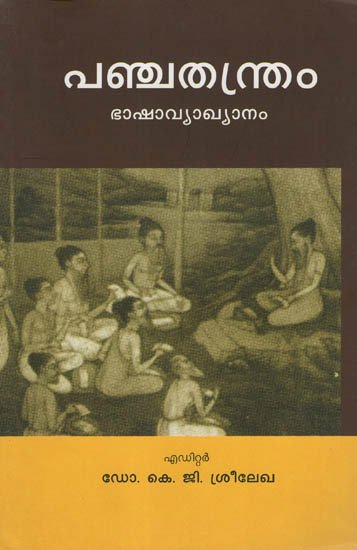Panchatantra [sanskrit]
by Dr. Naveen Kumar Jha | 2016 | 13,828 words | ISBN-13: 9788193077962
The Sanskrit edition of the Panchatantra referencing the English translation and grammatical analysis. Written by Vishnu Sharma and possibly dating as early as 1200 BCE, the Panchatantra (or Pancatantra) represents a collection of short stories teaching basic ethical values and moral conduct that was commonly practiced in ancient Indian. Alternative titles: Śrīviṣṇuśarman Pañcatantra (श्रीविष्णुशर्मन् पञ्चतन्त्र, Śrī-viṣṇuśarman pancatantra, श्री-विष्णुशर्मन्, Sri-visnusarman)
Verse 1.269
आदौ न वा प्रणयिनां प्रणयो विधेयो दत्तो ऽथवा प्रतिदिनं परिपोषणीयः ।
उत्क्षिप्य यत् क्षिपति तत् प्रकरोति लज्जां भूमौ स्थितस्य पतनाद् भयम् एव नास्ति ॥ २६९ ॥
ādau na vā praṇayināṃ praṇayo vidheyo datto 'thavā pratidinaṃ paripoṣaṇīyaḥ |
utkṣipya yat kṣipati tat prakaroti lajjāṃ bhūmau sthitasya patanād bhayam eva nāsti || 269 ||
The English translation of Panchatantra Verse 1.269 is contained in the book The Complete Pancatantra: Sanskrit Text with English Translation by Dr. Naveen Kumar Jha. This book is not available online so in order to read the full text and translation you should buy the book:
Buy now! English translation by Dr. Naveen Kumar Jha (2016)
Glossary of Sanskrit terms
Note: This extracts Sanskrit terms and links to English definitions from the glossary, based on an experimental segmentation of verse (1.269). Some terms could be superfluous while some might not be mentioned. Click on the word to show English definitions.
Adau, Ada, Adi, Pranayin, Pranaya, Vidheya, Datta, Athava, Pratidina, Pariposhaniya, Yat, Yad, Kshipat, Tat, Tad, Prakara, Lajja, Bhuma, Bhumi, Sthita, Patana, Bhaya, Eva, Nasti,
Analysis of Sanskrit grammar
Note: this is an experimental feature and only shows the first possible analysis of the Sanskrit text (Panchatantra Verse 1.269). If the system was successful in segmenting the sentence, you will see of which words it is made up of, generally consisting of Nouns, Pronouns, Verbs, Participles and Indeclinables. Click on the link to show all possible derivations of the word.
- Line 1: “ādau na vā praṇayināṃ praṇayo vidheyo datto 'thavā pratidinaṃ paripoṣaṇīyaḥ ”
- ādau -
-
ādau (indeclinable)[indeclinable]āda (noun, masculine)[nominative dual], [vocative dual], [accusative dual]ādi (noun, masculine)[locative single]ādi (noun, feminine)[locative single]
- na -
-
na (indeclinable particle)[indeclinable particle]na (noun, masculine)[compound], [vocative single]na (noun, neuter)[compound], [vocative single]
- vā -
-
vā (indeclinable conjunction)[indeclinable conjunction]vā (noun, feminine)[nominative single]√vā (verb class 1)[imperative active second single]
- praṇayinām -
-
praṇayin (noun, masculine)[genitive plural]praṇayin (noun, neuter)[genitive plural]
- praṇayo* -
-
praṇaya (noun, masculine)[nominative single]
- vidheyo* -
-
vidheya (noun, masculine)[nominative single]
- datto' -
-
datta (noun, masculine)[nominative single]√dā (verb class 3)[present active third dual]
- athavā -
-
athavā (indeclinable)[indeclinable]
- pratidinam -
-
pratidina (noun, masculine)[adverb], [accusative single]pratidina (noun, neuter)[adverb], [nominative single], [accusative single]
- paripoṣaṇīyaḥ -
-
paripoṣaṇīya (noun, masculine)[nominative single]
- Line 2: “utkṣipya yat kṣipati tat prakaroti lajjāṃ bhūmau sthitasya patanād bhayam eva nāsti ”
- Cannot analyse utkṣipya*ya
- yat -
-
yat (indeclinable relative)[indeclinable relative]yat (noun, masculine)[compound]yad (noun, masculine)[compound], [adverb], [nominative single], [vocative single]yat (noun, neuter)[nominative single], [vocative single], [accusative single]√i -> yat (participle, neuter)[nominative single from √i class 2 verb], [vocative single from √i class 2 verb], [accusative single from √i class 2 verb]yat (pronoun, neuter)[nominative single], [accusative single]
- kṣipati -
-
√kṣip -> kṣipat (participle, masculine)[locative single from √kṣip class 6 verb]√kṣip -> kṣipat (participle, neuter)[locative single from √kṣip class 6 verb]√kṣip (verb class 6)[present active third single]
- tat -
-
tat (indeclinable correlative)[indeclinable correlative]tad (noun, neuter)[compound], [nominative single], [accusative single]
- prakaro -
-
prakara (noun, masculine)[compound], [vocative single]prakara (noun, neuter)[compound], [vocative single]
- ūti -
-
ūti (noun, feminine)[compound], [adverb]ūti (noun, masculine)[compound], [adverb]
- lajjām -
-
lajjā (noun, feminine)[accusative single]
- bhūmau -
-
bhūma (noun, masculine)[nominative dual], [vocative dual], [accusative dual]bhūmi (noun, feminine)[locative single]bhūmi (noun, masculine)[locative single]
- sthitasya -
-
sthita (noun, masculine)[genitive single]sthita (noun, neuter)[genitive single]√sthā -> sthita (participle, masculine)[genitive single from √sthā class 1 verb]√sthā -> sthita (participle, neuter)[genitive single from √sthā class 1 verb]
- patanād -
-
patana (noun, masculine)[adverb], [ablative single]patana (noun, neuter)[adverb], [ablative single]
- bhayam -
-
bhaya (noun, masculine)[adverb], [accusative single]bhaya (noun, neuter)[adverb], [nominative single], [accusative single]bhayā (noun, feminine)[adverb]
- eva -
-
eva (indeclinable particle)[indeclinable particle]eva (noun, masculine)[compound], [vocative single]eva (noun, neuter)[compound], [vocative single]
- nāsti -
-
nāsti (indeclinable)[indeclinable]
Other editions:
Also see the following editions of the Sanskrit text or (alternative) English translations of the Panchatantra Verse 1.269
Pancatantra of Visnusarman
by M. R. Kale (2015)
Panchatantra in Simple Sanskrit
by Dr. Vishwas (2016)
Panchatantram (Telugu)
by Tadanki Venkata Lakshmi Narasimha Rao (2020)
Published by J. P. Publications, Vijayawada; Throughout black & white Illustrations; 9788192053851.
Buy now!Preview of verse 1.269 in Telugu sript:
ఆదౌ న వా ప్రణయినాం ప్రణయో విధేయో దత్తో ఽథవా ప్రతిదినం పరిపోషణీయః ।
ఉత్క్షిప్య యత్ క్షిపతి తత్ ప్రకరోతి లజ్జాం భూమౌ స్థితస్య పతనాద్ భయమ్ ఏవ నాస్తి ॥ ౨౬౯ ॥
Panchatantram Bhashavyakhyanam (Malayalam)
by Dr. K.G. Sreelekha (2010)
Published by the University of Kerala.
Buy now!Preview of verse 1.269 in Malayalam sript:
ആദൌ ന വാ പ്രണയിനാം പ്രണയോ വിധേയോ ദത്തോ ഽഥവാ പ്രതിദിനം പരിപോഷണീയഃ ।
ഉത്ക്ഷിപ്യ യത് ക്ഷിപതി തത് പ്രകരോതി ലജ്ജാം ഭൂമൌ സ്ഥിതസ്യ പതനാദ് ഭയമ് ഏവ നാസ്തി ॥ ൨൬൯ ॥
The Panchatantra Stories (Tamil)
by P. S. Aacharya (2017)
Published by Narmadha Pathippagam, Chennai.
Buy now!
Panchatantrer Galpa (Bengali)
by Children's Book Trust (2014)
Throughout color Illustration; 9788170112730
Buy now!Preview of verse 1.269 in Bengali sript:
আদৌ ন বা প্রণযিনাং প্রণযো বিধেযো দত্তো ঽথবা প্রতিদিনং পরিপোষণীযঃ ।
উত্ক্ষিপ্য যত্ ক্ষিপতি তত্ প্রকরোতি লজ্জাং ভূমৌ স্থিতস্য পতনাদ্ ভযম্ এব নাস্তি ॥ ২৬৯ ॥
Panchatantra in Gujarati (Comic)
by Anant Pai (2013)
[શિયાળા અને રણશિંગ પંચતંત્ર] Published by Amar Chitra Katha; Throughout Color Illustrations; 9789350853115
Buy now!Preview of verse 1.269 in Gujarati sript:
આદૌ ન વા પ્રણયિનાં પ્રણયો વિધેયો દત્તો ઽથવા પ્રતિદિનં પરિપોષણીયઃ ।
ઉત્ક્ષિપ્ય યત્ ક્ષિપતિ તત્ પ્રકરોતિ લજ્જાં ભૂમૌ સ્થિતસ્ય પતનાદ્ ભયમ્ એવ નાસ્તિ ॥ ૨૬૯ ॥
![Panchatantra [sanskrit] - book cover](/uploads/a/Pancatantra.jpg)






